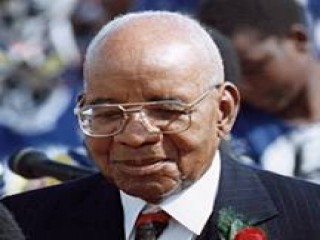
Hastings Banda biography
Date of birth : -
Date of death : 1997-11-25
Birthplace : Kasungu District of Nyasaland, Malawi
Nationality : Malawian
Category : Politics
Last modified : 2011-06-03
Credited as : Politician, first President of Malawi, former Prime Minister of Malawi
Hastings Kamuzu Banda was a leader in Malawi's struggle for independence, and he became the country's first president. An acknowledged nationalist, he nevertheless frankly advocated trade and diplomatic relations with white-dominated African countries.
Hastings Banda was born to poor parents of the Chewa tribe in the Kasungu District of Nyasaland, a British protectorate, which achieved independence as Malawi in 1964. Banda's early education at the Church of Scotland's Livingstonia Mission school in Kasungu fired his ambition for learning. About age 13 he set out to walk to South Africa to continue his education. He stopped to work in an African hospital near Salisbury, Southern Rhodesia (now Zimbabwe). An uncle helped him to reach Johannesburg, where he worked as a clerk in a gold mine.
Banda traveled to the United States in 1923 and earned a high school diploma from Wilberforce Academy in 1928. He worked as a Bantu language adviser at the University of Chicago until he earned a doctorate in 1931. He then entered Meharry Medical College in Nashville, Tennessee, and in 1937 received a doctorate of medicine. To qualify for practice in Great Britain, he went to Scotland and earned medical diplomas at the universities of Glasgow and Edinburgh in 1941. He also became an elder in the Church of Scotland. Banda first practiced at the Tyneside Mission for Colored Seamen (1944) and then in a London suburb from 1945 to 1953. His home was a gathering place for Nyasas and for early African nationalist leaders. In 1951 he published a paper criticizing racial policies in Southern Rhodesia, which was then pressing for a federation of Rhodesia and Nyasaland. When the federation was imposed in August 1953, Banda went to Ghana as a physician to the poor Zongo people and to campaign for the independence of his homeland.
Banda agreed in 1958 to return home to lead Nyasaland out of the federation. However, he first headed a delegation to London to petition for a new constitution. He returned to Nyasaland on July 6, 1958. On August 1, 1958, he was elected president of the Congress party. Mounting anti-federation riots led to a state of emergency on March 3, 1959, and Banda was imprisoned in Southern Rhodesia for 13 months. Upon his release he assumed leadership of the Malawi Congress Party. In June 1960 he accepted a new constitution from Britain which gave Africans a majority in the Legislative Council. On February 1, 1963, he became his country's first prime minister. Independence came on July 6, 1964, and on July 6, 1966—when Malawi became a republic within the Commonwealth—Banda became Malawi's first president.
After independence and the creation of a one-party state, Banda had to reconcile the left-wing younger leadership with his own more conservative policies. His firm control—some called him dictatorial—was challenged by dissident ministers in an unsuccessful coup d'etat that lasted from 1964 to 1965. However, Banda's wide-based support among the people of Malawi was shown in 1967, when villagers directed police to conspirators plotting to kill him. Opposition was based partly on Banda's retention of British civil servants as department heads and partly on his frank recognition of landlocked Malawi's economic dependence on nearby white-ruled South African countries. Banda deplored segregation, but he believed the country could secure badly needed development loans from Rhodesia and South Africa. He maintained reasonable rapport with black African states while initiating trade, loan, and diplomatic relations with white African states.
Elected president for life in 1971, Banda maintained his leadership until economic issues associated with the loss of Western aid in 1992 and a serious illness in 1993 led to his defeat in Malawi's first multiparty elections, held in May 1994. He was succeeded in office by Bakili Muluzi of the United Democratic Front (UDF).
In 1995 Banda and two others were charged with conspiracy to commit murder in connection with the 1983 deaths of four political adversaries. Although the three were later acquitted, the scandal still raged in 1997 as the prosecution appealed a ruling made by the presiding judge in the case that blocked key evidence from the trial. In addition, the UDF government began a thorough inquiry into Banda's financial affairs, especially concerning the personal wealth he amassed from business ventures believed to have been bankrolled by public funds.
In 1995 Banda was dispossessed of the Press Trust, a successful conglomerate, and charged with fraud in the misappropriation of funds intended for the construction of a school in his home district. Banda was later pardoned in the fraud case due to his extreme age and ill health. In May 1997 the UDF Minister of Lands and Valuation directed the reallocation of 2,000 acres that Banda had illegally seized in 1978 and on which he had established a cattle ranch. Despite Banda's myriad legal woes, advanced age, and failing health, he remained a dominant force within the Malawi Congress Party, which in July 1997 was poised to merge with another opposition party, the Alliance for Democracy.

















